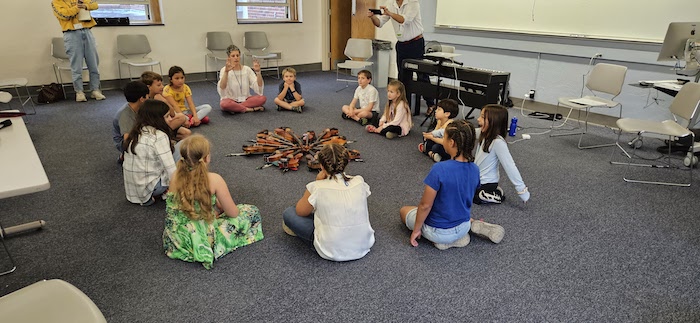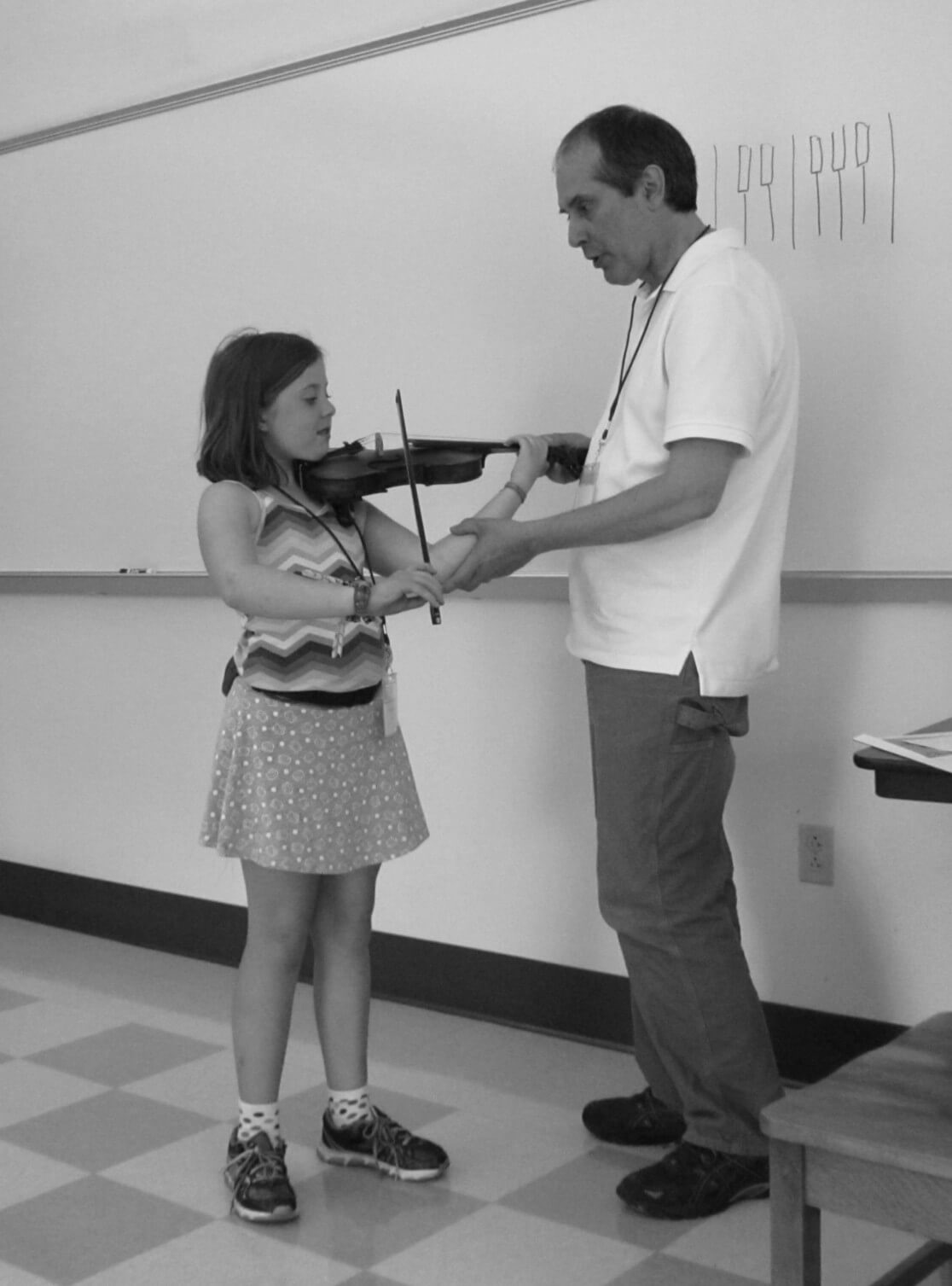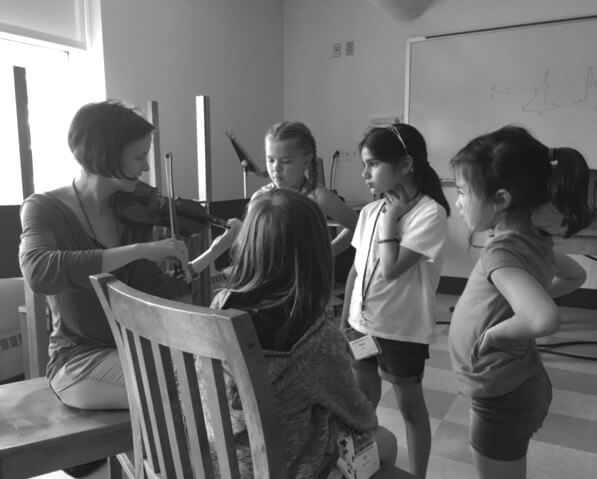
Master & Group Class Descriptions
Master Classes
These lessons are a shared experience. Students in the Budding Artist program will be placed in master classes of 4 students per class. Young Artists will be 3 per class and Rising Artists will be 2 per class. While one child receives individual attention, the others in the class observe. Parents attend and take notes to manage the child's practice time outside of class efficiently. The emphasis of master class lessons at NESI is to strengthen one or two technical or musical issues that the student presents at the first lesson. Students will use polished repertoire and not learn new music during these classes. Please ask your home teacher to help determine your polished piece. Read more about the Master Class experience at NESI below.
Group Classes
Organized by book level, musical and ensemble skills are addressed as students play their common repertoire together.
Masterclasses & the Spirit of NESI
By Wendy Sawicki
I recently had a conversation with Yasmin about what makes NESI so special. My first reaction was “it is the spirit.” This conversation has caused me to reflect on what the NESI spirit really is.
My first experience with NESI was at Bates College in 2003 with my daughter Megan. At the time, she was 6 years old and was at the end of year-two of figuring out how to play this instrument called the violin. We went as a commuter without any idea of what to think. First on her schedule was a masterclass with Betsy Kobayashi. I had no idea what to expect when we entered this tiny room with 3 other girls and their moms or dads. Megan stood up in front of Betsy and I was amazed at how brave she was to find the notes of Go Tell Aunt Rhody in front of 7 complete strangers. Fast forward to the end of the masterclass and walking out of the room. I was approached by another mom, who said to me “When your daughter played that song it brought tears to my eyes.” I thought um, ok.... After a little more reflection that day, it dawned on me that this was a compliment as Megan’s music had made an impression on another person. I discovered that week that there is a special spirit among these Suzuki families. I couldn’t recall being gathered in a setting with so many other families in which so much kindness paired with so much hard work existed. I was hooked.
Dr. Suzuki is known for many inspirational quotes. One of my favorites sums up the spirit that I felt at our first institute: “Teaching music is not my main purpose. I want to make good citizens. If children hear fine music from the day of their birth and learn to play it, they develop sensitivity, discipline and endurance. They get a beautiful heart.” I could see this in action at NESI.
The concept of the whole masterclass thing was fascinating to me. While my first thought was “I wonder how much benefit a young child could get in a 15 minute lesson,” my observations and conversations with teachers and other parents quickly created a clear picture of the benefits.
Betsy Kobayashi shared that when a participating child is listening but not on the spot, they are relaxed and can listen and observe. They can see that they are not the only ones working on similar things. Even at the advanced level, some students will go to observe a masterclass without taking a lesson. They are able to learn so much through these observations. Betsy studied with Dr. Suzuki, and she shares that in Matsumoto, Japan, most classes were masterclass style. There would be 6 children with one violin with Dr. Suzuki, observing, participating and learning both individually and from each other. The class would be perhaps 3 hours long with young children taking needed breaks.
Aimee Morrill Briant shared that parents can take notes for all of the kids’ lessons for their own use. By observing other students’ lessons, parent and child can go home with many practice points beyond those specific to their child. Returning home with a huge arsenal of practice tools after an institute can reinvigorate practices well after the institute is over.

Clorinda Noyes shared that parents as observers and hopefully note-takers can see where the common struggles are, where the common breakthroughs occur, and observe the process of learning as it occurs between another student and teacher. They can gain respect for the way their own child processes the experience which can create compassion and understanding in those challenging moments of home practice. She also shared that as a teacher, she has seen her students return from Institute weeks to pick up new songs much more quickly when they have been in a class where those songs were worked on by others, than if they had not had that experience.
As I reflect upon my own experience of many masterclasses, I realize how much I have gained as a parent. I do not feel alone during some of the periods of frustration. I have a support network and camaraderie around me. My kids have created friendships, and some years this is enough inspiration to stop the feeling of wanting to throw in the towel. I have utilized techniques, ideas or approaches that I saw teachers use with others (not to mention the ones specifically for my children) to spice up a practice. It’s heartwarming to watch my kids find their own motivation when another student is working on the “next” song. They would spend many hours during that week with that student on their own time to communally figure out how to play that song.
Returning to Megan, three years after her first NESI experience in Betsy’s masterclass, she again had the pleasure of working with Betsy in another masterclass. A couple of students in that class were fine tuning the art of vibrato. Megan was about ready to learn, but had not yet taken that leap. After observing for two days, she asked Betsy to give her an exercise to help her learn. Megan added that to the exercises she saw the other students doing and it clicked. Megan left NESI with a beautiful vibrato and a whole lot of confidence and pride. “Where love is deep, much can be accomplished.”
The masterclass concept embodies the spirit of NESI. It is an opportunity to observe, to share, to support and to succeed. Dr. Suzuki states, “An unlimited amount of ability can develop when parent and child are having fun together.” This spirit exists at NESI and provides periodic spurts of encouragement and motivation throughout the year. I am still hooked.

